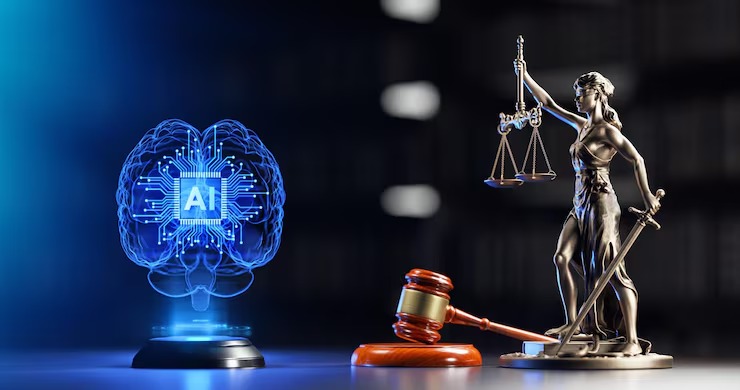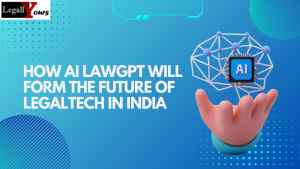The legal profession is one that has been regarded as one of the most traditional sectors in the world. For centuries, the lawyers have used the case law, court precedents, and intricate documentation to guide clients and settle the disagreements. However, as the artificial intelligence (AI) grows, it is a paradigm shift. Technology is no longer a supporting tool but it is becoming an engine of legal excellence today. From AI Law GPT for lawyers to online attorney consultation platforms, AI is reshaping how law firms operate, how clients access justice, and how the future of legal practice is defined.
In this blog, we’ll explore how AI and law intersect, the benefits and challenges of this integration, and why embracing legal technology is key for the modern legal industry.
The Growing Role of AI in the Legal Sector
Artificial Intelligence has taken over almost all industries, and law is not an exception. Contemporary legal activities result in huge volumes of information court rulings, laws, contracts, and client files, etc. Conventionally, these documents were digitized, and lawyers together with paralegals would spend hours searching through them. That is what AI is doing now by automating the time-consuming processes.
Among notable changes is the application of AI Law GPT for lawyers, a conversational AI, which is capable of going over contracts, writing legal documents, responding to client questions, and even performing initial research on a case. The technology does not only raise efficiency, but also enables legal professionals to focus more time on strategy and advocacy of their clients.
On the same note, AI-based online attorney consultation services are removing the barrier between attorneys and consumers. People no longer need to go to a physical law office and get preliminary advice. They can rather log in, consult an AI-assisted lawyer remotely and get advice in real-time. This renders legal services easier and more affordable to the masses.
Why AI Law GPT for Lawyers is a Game Changer
When discussing AI in law, the discussion most frequently begins with AI Law GPT for lawyers. Compared to generic chatbots, AI Law GPT can be trained on large databases of legal texts to make context-specific answers. This is how it is changing the practice of law:
1. Automated Document Drafting
Contracts, affidavits, and agreements are frequently written up by lawyers. The AI Law GPT can create first drafts within a few seconds, which means that the lawyer does not have to write a first draft but just refine the existing one.
2. Legal Research Made Easy
Lawyers do not have to go through thousands of cases to find a solution to a certain case; they can ask a question from AI Law GPT and get an answer, synthesized and relevant with references.
3. 24/7 Client Interaction
Clients often pose questions when they are not in the office. AI Law GPT enables companies to provide 24/7 services to clients, which increases customer satisfaction levels.
4. Reduced Operation Costs
Routine activities can be automated thus allowing firms to lower the cost of running the business making operations of legal services affordable and competitive.
5. Enhanced Productivity
The lawyers are able to work on high-value tasks like courtroom strategy, negotiation, and defending clients where the AI Law GPT does the background work.
To put it briefly, AI Law GPT and lawyers do not factor each other out; it empowers their abilities and allows them to provide quicker, wiser, and more efficient services.
Online Attorney Consultation – Redefining Client Access
Gone are the days when seeking legal advice required one to book an appointment, travelling to a law firm, and waiting days before being able to consult the lawyer. As the online attorney consultation increases, clients are able to get access to the legal expertise at the comfort of their homes.
This model is particularly beneficial for:
- People in Remote Areas: Previously, people who were unable to locate a lawyer in the area can now use the services of qualified attorneys online.
- Busy Professionals: Busy people will be able to book appointments without interfering with their work schedules.
- Budget-Conscious Clients: Even traditional legal services tend to be more expensive than online consultations.
With AI solutions such as AI Law GPT, these websites can filter cases in advance, collect information about the client and give a first-time consultation and then match the client to a lawyer. It is a smooth procedure that guarantees communication and efficiency.
The Main Advantages of AI in the Legal Industry
1. Accessibility
AI-based applications allow legal services to be accessible to all people with access to the internet. Online attorney consultation services, in particular, break down barriers to justice.
2. Speed and Efficiency
Legal research that once took days can now be completed in minutes with AI assistance.
3. Cost-Effectiveness
By automating repetitive tasks, law firms save money, and clients pay less for services.
4. Consistency
AI ensures consistent analysis of legal documents, reducing human error.
5. Scalability
Firms can handle more cases without increasing staff, thanks to tools like AI Law GPT for lawyers.
Challenges of AI in Law
Although AI in law has its benefits, it is also associated with problems that its users must tackle:
- Data Privacy Issues: Legal information is usually sensitive. Client confidentiality is very important when using AI platforms.
- Ethical Implications: AI is not meant to substitute human consideration, but rather assist lawyers. Machines cannot be left to make decisions that will affect justice.
- Regulatory Uncertainty: A lot of jurisdictions do not have clear standards on the adoption of AI in law.
- Problems with Accuracy: AI tools are potent, but can be inconsistent and biased. Attorneys have to triangulate information provided by AI.
The Future of AI and Legal Excellence
In the future, AI will have an even more significant impact on the legal environment. Some potential developments include:
1. AI-Powered Court Assistance
There is a possibility that soon the courts may begin to use AI to administer their cases, conduct hearings and even provide real-time legal interpreters.
2. Predictive Legal Outcomes
Artificial intelligence may be used to predict the results of a case by comparing judgements of past cases, enabling attorneys to think more strategically.
3. Virtual Law Firms
Entire firms may operate online, powered by AI Law GPT for lawyers and online attorney consultation platforms, reducing overhead costs.
4. Blockchain and Smart Contracts
Contracts can be handled on blockchain to a greater extent, making the process of managing contracts less contested and transparent.
5. Legal Education Transformation
Legal education will be more practical and technology-based as law students will be able to conduct research and case simulations using AI.
Balancing Technology with Human Judgment
Even though AI will most definitely be capable of automating and accelerating most of the fields of law, it will never be capable of replacing the judgement, knowledge, and ethical consideration of human lawyers. The machine is unable to know the full feelings of a client and how to go through the nuances of human behavior.
The most important aspect of outstanding legal work is striking a balance between AI and human knowledge. For instance, AI Law GPT for lawyers can draft a contract, but only a lawyer can negotiate terms that truly protect a client’s interests. Similarly, online attorney consultation platforms can connect clients to legal experts quickly, but only a human attorney can empathize with the stress and challenges that clients face.
Conclusion
AI is not a far-off vision but it is already reshaping the legal industry in a radical manner. Technology is streamlining the law, making it more user-friendly and accessible to a wider audience because of online attorney consultation, and other conveniences like the ability to automate documentation with AI Law GPT for lawyers.
But the best thing about the law is not substituting lawyers but giving them the necessary means of doing it. With the further development of AI, the law firms and the attorneys that will adopt this technology will not only remain competitive, but also become the pioneers of the justice provision.
Finally, the meeting of AI and law is not the opposition of machines and people – it is cooperation. Collectively, they are capable of creating a more accessible, fairer and faster legal system.










